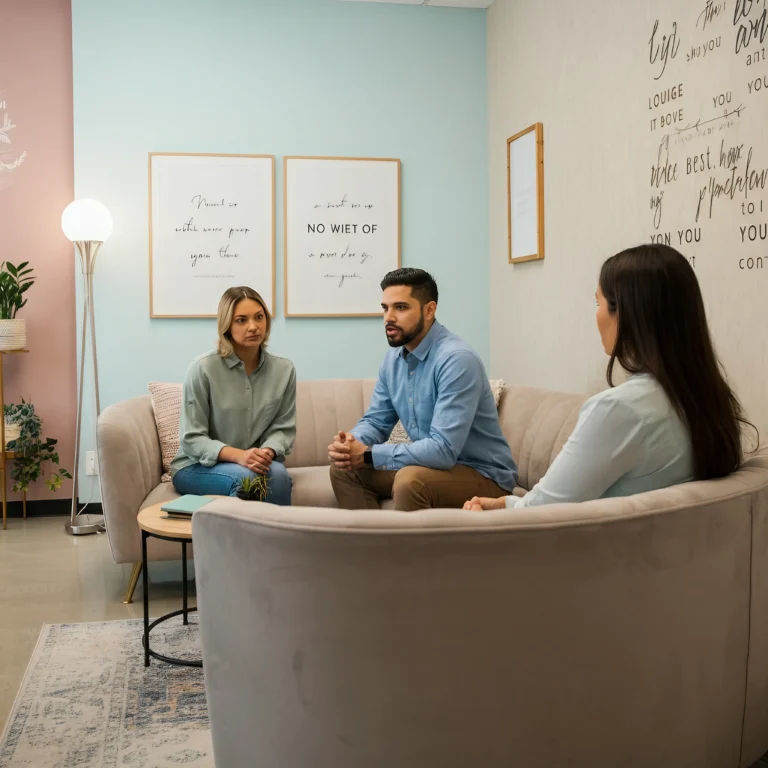Marriage is a beautiful partnership, but anyone who’s been in one knows it isn’t always smooth sailing. Over time, challenges can arise that test even the strongest of unions—miscommunication, unresolved conflicts, or simply life pulling you in different directions.
This is where marriage counseling comes in. It’s not just for couples on the brink of disaster (a common misconception) but for anyone wanting to strengthen their bond, resolve issues, or simply learn how to communicate better.
If you’ve been wondering whether marriage counseling might be the next best step for your relationship, this guide has everything you need—from identifying the need for help, to understanding what happens in a session, and finally, how to find the counselor that’s right for you.
Recognizing When it’s Time to Seek Help
How do you know if you and your partner would benefit from marriage counseling? Here are some common signs to look out for:
- Frequent Arguments: Every couple argues, but if you find yourselves locked in the same fight over and over again, it might be time to address the underlying issues.
- Communication Breakdown: If conversations with your partner feel more like misunderstandings, or you’ve stopped trying to talk altogether, this is a prime red flag.
- Growing Apart: Feeling emotional distance from your partner despite living under the same roof? This is a sign counseling might help bridge the gap.
- Recurring Trust Issues: From small lies to bigger betrayals, unresolved trust issues can erode the foundation of your marriage. Counseling can provide tools to rebuild it.
- Intimacy Issues: Whether physical or emotional, waning intimacy might be an area that needs focused attention.
The good news? These are all areas that couples therapy is designed to help with.
What to Expect From Marriage Counseling
It’s natural to feel nervous about going to your first counseling session. After all, you’re venturing into the unknown. To ease your mind, here’s a quick breakdown of what you can expect when you meet with a counselor.
- An Open Space: The counselor will create a safe, neutral environment where you and your partner can share honestly.
- Identifying the Core Issue(s): The first few sessions might center around identifying patterns or specific challenges in your relationship.
- Collaborative Effort: Think of your counselor as a guide rather than a judge. They’re here to help, not to choose sides.
The goal isn’t to “fix” one partner or the other. It’s to develop shared tools and strategies that work for both of you, laying the foundation for long-term success.
Types of Counseling Approaches for Couples
Counseling isn’t one-size-fits-all. The best therapists adapt their techniques based on your unique situation. Here are a few approaches commonly used for couples therapy:
- Emotionally Focused Therapy (EFT): This approach focuses on uncovering and resolving deep-rooted emotional wounds that affect your relationship.
- Cognitive Behavioral Therapy (CBT): CBT identifies unhealthy thoughts and behaviors, replacing them with constructive ways of thinking and acting.
- Imago Relationship Therapy: Imago therapy helps partners understand how past wounds may play a role in current conflicts and teaches empathy-driven communication.
- Solution-Focused Therapy: This method hones in on specific problems and utilizes practical techniques for change.
Each approach has its strengths, so it’s important to find a counselor who specializes in a method (or combination) that works for both of you.
The Many Benefits of Marriage Counseling
Still on the fence about whether therapy is worth it? Here are some tangible ways it can elevate your relationship:
- Better Communication: Learn how to articulate your feelings and listen to your partner without judgment.
- Deeper Connection: Strengthen emotional intimacy by understanding each other’s needs more deeply.
- Conflict Resolution Skills: Gain tools to prevent small disagreements from escalating into full-blown arguments.
- Trust Restoration: A good counselor can guide you both in rebuilding broken trust and creating a safer emotional space.
Addressing Resistance to Counseling
Not all couples are eager to jump into therapy. Sometimes, one partner might resist the idea altogether. Is that your situation? Don’t worry—it’s more common than you think.
Here’s how to approach the topic if your partner is hesitant:
- Focus on Growth: Frame counseling as a chance to grow together rather than “fix” the relationship.
- Normalize the Process: Share stories of other couples who’ve benefitted from therapy. Often, people are more open to it once they realize it’s not just for “problems.”
- Start Small: Suggest trying just one session as a trial. A good first experience might make your partner more open to continuing.
Remember, effective therapy requires both partners to participate with an open mind and willingness to work together.
How to Find the Right Marriage Counselor
Finding the right therapist can feel overwhelming, but it doesn’t have to be. Here are some tips to help guide your search:
- Research Credentials: Look for a licensed therapist with expertise in couples therapy, such as someone trained in LMFT (Licensed Marriage and Family Therapy).
- Prioritize Compatibility: It’s crucial that both you and your partner feel comfortable with the counselor. You should both feel respected and heard.
- Read Reviews: Check testimonials or recommendations from other couples.
- Ask Questions: Don’t hesitate to inquire about their approach or experience with cases similar to yours.
Finding the right fit can make all the difference in the success of your sessions.
Choosing Your Marriage Over Misunderstandings
No marriage is perfect, and there’s strength in seeking help when challenges arise. Relationships require work, commitment, and sometimes the guidance of an expert to help you and your partner find your way back to each other.
If you and your spouse feel like marriage counseling could help strengthen or heal your relationship, take the next step today. When both partners invest in better communication and understanding, the results can be extraordinary.
Your future together is worth it.
Meta Title: Why Marriage Counseling Can Transform Relationships
Meta Description: Want a stronger relationship? Learn how marriage counseling helps couples improve communication, intimacy, and resolve conflicts effectively.





















0 Comments